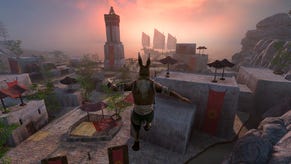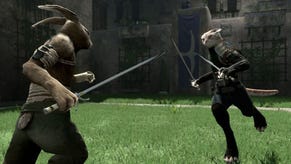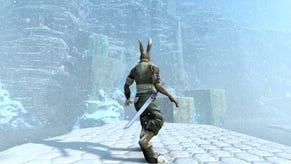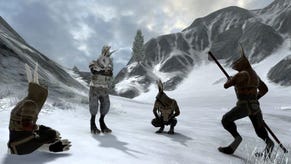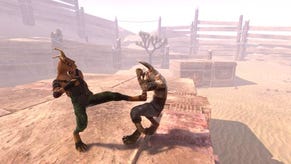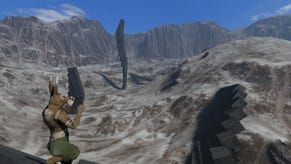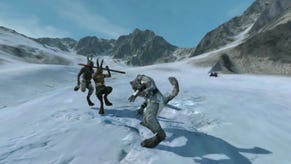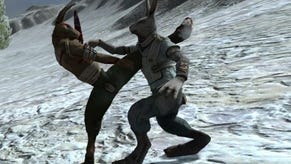Rabbiting On: The Overgrowth Interview
Hare Brained
Overgrowth is a game about anthropomorphic animals fighting each other. It looks awesome. When things look awesome I tend to like to talk to the people who made them, and that's what happened here. I talked to David Rosen, Overgrowth developer Wolfire's lead programmer. You can read our question and answer session below. It is highly informative.
RPS: What is Overgrowth? And I mean really *what is it*!? The emphasis means: "What are the fundamental design principles and ultimate aspirations of your game?" Something like that.
Rosen: The fundamental design goal for Overgrowth is to create combat encounters that look like choreographed martial arts scenes in films, but are actually closely controlled by the player. This control is exercised on many levels: at the highest level you can move freely across the terrain and choose how you want to approach each objective. At the lowest level, there are always decisions to make; you're never stuck in unbreakable combos or non-interactive animations.
Another goal is much simpler: just make the game work well with modern PC gaming habits. This means windowed mode support, alt-tab support, graphics and control options, a permanent online download link, no splash screens, and no online drm.

RPS: I've been watching some of your trailers, and that bit where the rabbit was all bleeding and stuff... that was a bit dark?
Rosen: Yes, yes it was. In Overgrowth, there will often be choices between different levels of violence. There's no "good and evil" bar or any other judgement of the player, but I think it's important to do our best to depict the consequences of your actions, at least as much as we can within the scope of the game. If you don't want to see enemies bleed out from their necks, then maybe you shouldn't go around cutting their throats!
This was one of the major reasons for using animal hybrid creatures instead of humans -- I really wanted to show serious physical trauma and pain, and to do that I have to watch these gaping wounds and broken limbs over and over again to make sure they are working correctly. I just don't want to spend all day watching that happen to real humans or animals. It bothers me a lot less to see it happen to creatures that don't actually exist.

RPS: Tell me a bit more about what players will experience in Overgrowth? What will happen as I go around beating up dudebeasts?
Rosen: The game is generally broken down into missions, which usually involve beating up dudebeasts to some degree. For example, you might have to infiltrate a raider camp and retrieve something, and it's up to you exactly how you'd like to do that. Usually there are a number of conflicting meta-objectives in action games, such as progressing the story, acquiring loot and upgrades, and getting achievements. In Overgrowth, we're thinking of splitting these into different modes, so they don't conflict. For example, the story mode would have series of missions with a continuous plot, the challenge mode would have missions that you need to beat in a specific way to demonstrate your skill, and the arena mode would have you fighting in matches as a gladiator, and acquiring new weapons, armor and skills.

RPS: You're obviously relishing experimenting with technology to get this done, what has been the most interesting bit so far, and why?
Rosen: It's hard to pick just one thing, but I think procedural animation is the most important technology I've been playing with, because it lets us make the controls much more responsive. This probably sounds like a non-sequitur, so I'll elaborate. There are usually two ways to transition from one animation to the next: the first method is to simply cut or cross-fade from one to the next, which usually looks pretty unrealistic. The second method addresses this problem by creating a transition animation, for example, bridging an 'idle' to 'run' transition with a 'start running' animation. This looks great in videos and trailers, but if you actually play the game, it can feel clunky and laggy -- the controls frequently stop responding to allow a transition animation to play.
In Overgrowth, I try to smooth over transitions using procedural constraints, such as maintaining the angular momentum of the torso and arms as much as possible, and driving acceleration tilts and dips separately from keyframe animations. This allows cross-fade transitions to look alright without interfering with the character physics, so the controls are always as responsive as possible.

RPS: What did being a part of the first Humble Indie Bundle mean for you guys? (I totally know this stuff because I was at GDC! But it's nice to have it related to our readers.)
Rosen: The income from the HIB was really helpful, but more importantly, it raised a lot of good will toward Wolfire and spread awareness of Lugaru. We have a thread in the "secret preorder forum" asking customers how they heard about us, and they often mention the Humble Bundle. It was so successful that Jeff and John split it off into a separate company so they could focus on running future bundles while Aubrey and I work on Overgrowth.
RPS: How much has Overgrowth's development relied on feedback from its community? Is that a route you'd recommend to other indies? Are there any problems generated by having a close community?
Rosen: We have a clear vision of what the game should be like, so feedback doesn't alter the course too much, but it can change smaller things. For example, people kept requesting a 'flail' animation for when characters fall too far, so I added one, since it seemed easy enough. Then every week they kept finding problems with it, so I iterated on it a couple more times and eventually we had a pretty nice flail animation.
It can be stressful showing off a work-in-progress every week, because there are always unfinished bits. Some people always point to them and yell "That's terrible! You're terrible at making games!" And of course those parts aren't great, they're not done yet. But you just have to develop a thick skin for that kind of thing.
RPS: Do you guys have a pet rabbit? Work closely with real rabbits? Any other rabbit data I could collect here?
Rosen: I don't have much experience with rabbits -- the only rabbit data I have is that real rabbits don't make much noise, so we had to splice together other animal noises to create vocalizations for them. I have some dog data too; the company Wolfire is named after a dog that Jeff and I used to have, called Wolfie.
RPS: What challenges still lie ahead for you in making Overgrowth?
Rosen: The challenge is just doing so much work with so few people! We have to finish the combat system, then work on the different mission types and AI variants, then put together the story, challenges, and arena missions. Then lots of balancing, testing and optimization, and then we should be done.
RPS: What other indie game are you most excited about? And no equivocation! You must choose a favourite and therefore imply that all other indie games are somehow worse/depressing/doomed.
Rosen: I usually don't pay much attention to games until I can actually play them, and once I've played through them, I can't exactly be excited about them anymore. However, I haven't tried Journey by ThatGameCompany, and the trailers looked interesting, so I guess I can be excited about that.
RPS: Thanks for your time.



